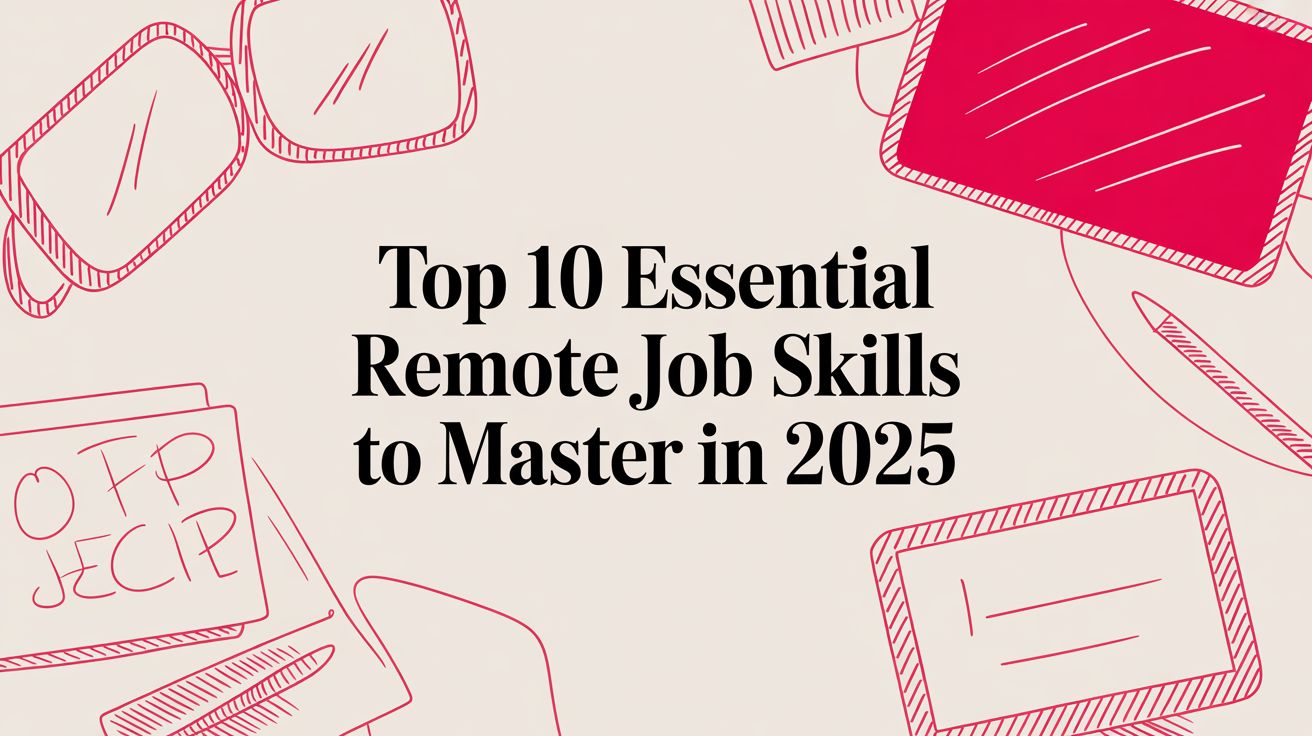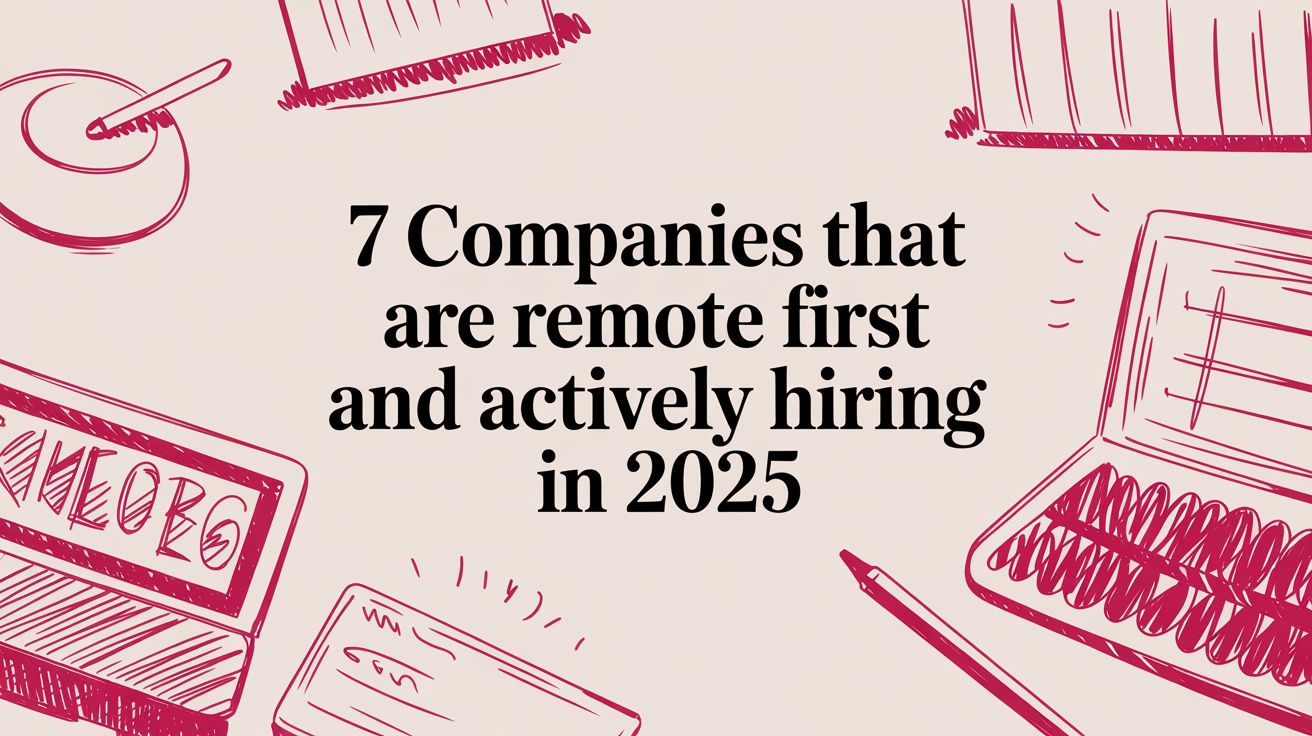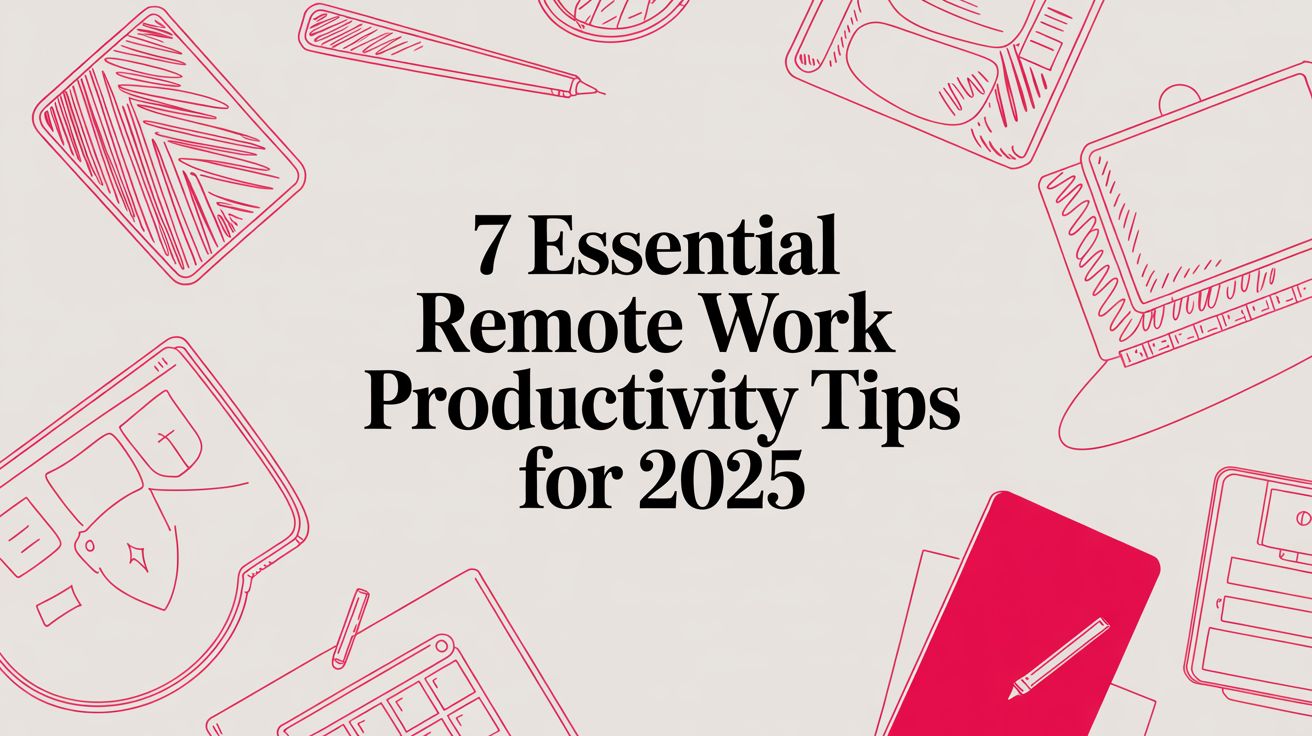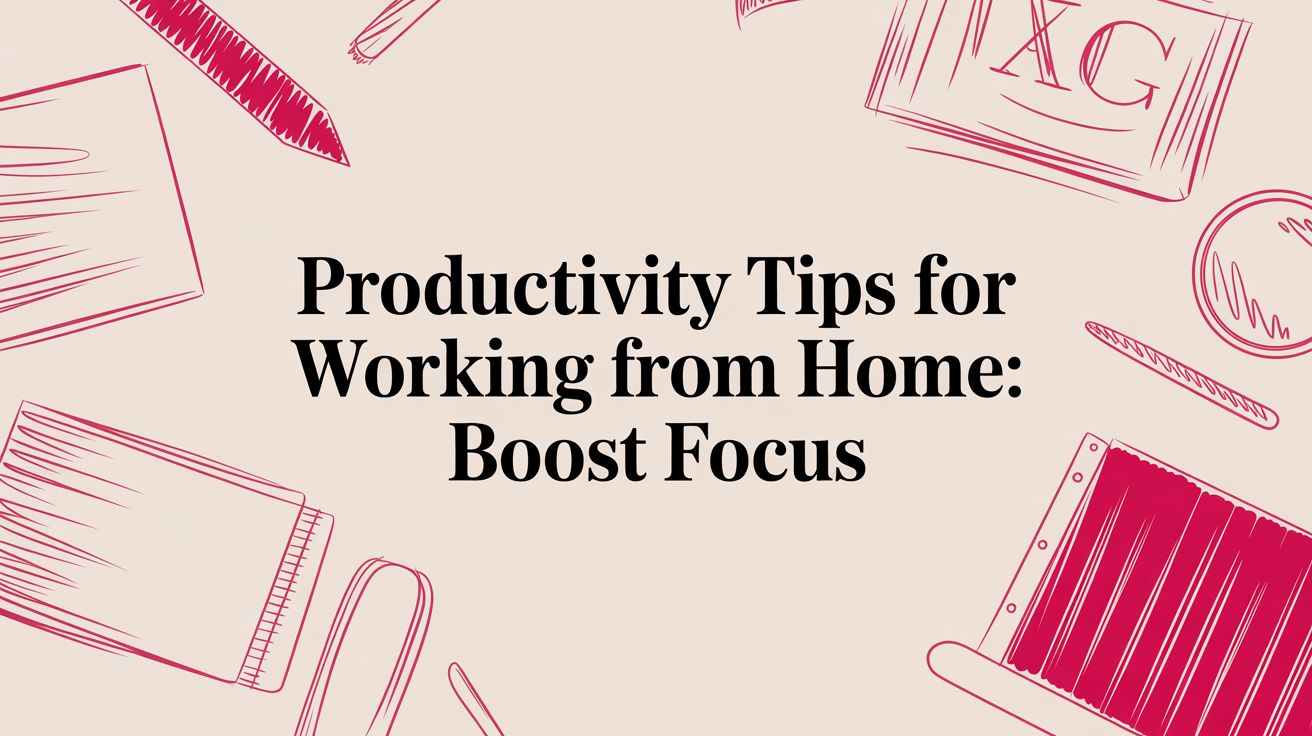Finding high-value contract jobs remote is all about shifting your mindset. Forget thinking about these roles as temporary gap-fillers. The game has changed. Companies are now building flexible, expert teams with specialized talent, and they need contractors who can jump in and deliver results without a lot of hand-holding. This guide will walk you through exactly how to position yourself as that go-to expert.
The Reality of Today’s Remote Contract Market
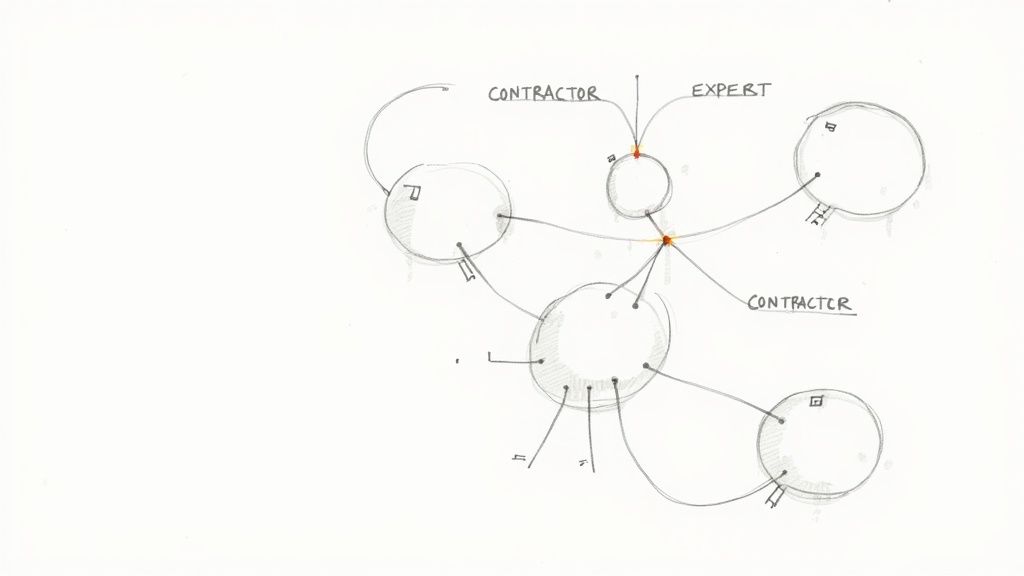
The whole concept of remote contract work has done a complete 180. It’s not just about covering for someone on leave or handling a one-off project anymore. These days, smart businesses are weaving remote contractors into their core operations. It’s a strategic move to tap into specialized skills, stay nimble, and scale up (or down) without the overhead.
For professionals who can operate as independent, high-impact players, this is a massive opportunity.
But here’s the catch: as the opportunities have gotten better, the competition has gotten tougher and the expectations have skyrocketed. To really make it, you have to stop seeing yourself as a temporary hire. You’re a specialized business partner who solves very specific problems. That mental shift is what separates the top-tier contractors from everyone else.
Understanding the Demand for Expertise
The market for contract jobs remote is screaming for seasoned pros. The data doesn’t lie—remote work is here to stay. And a jaw-dropping 66% of remote job listings are looking for experienced professionals. On top of that, another 18% are for managers and 9% for senior managers. The message is crystal clear: companies are hiring contractors for what they know, not just for an extra pair of hands.
This trend is fueled by a few key business needs:
- Access to Specialized Skills: Why hire a full-time employee for a six-month project when you can bring in a world-class expert?
- Increased Agility: Contractors give businesses the power to adapt to market changes in real-time, scaling their teams on demand.
- Cost-Effectiveness: For project-based work, a contractor is often the smarter financial choice, sidestepping the costs of benefits and long-term salaries.
The most successful remote contractors get it. They aren’t selling their time; they’re selling outcomes. Their entire professional brand—from their resume to how they interview—is built around a proven track record of delivering measurable results.
To really get ahead in this market, you have to keep your finger on the pulse of the industry. Staying current on the latest remote work trends will give you a serious competitive advantage.
Building Your Contract-Ready Professional Brand
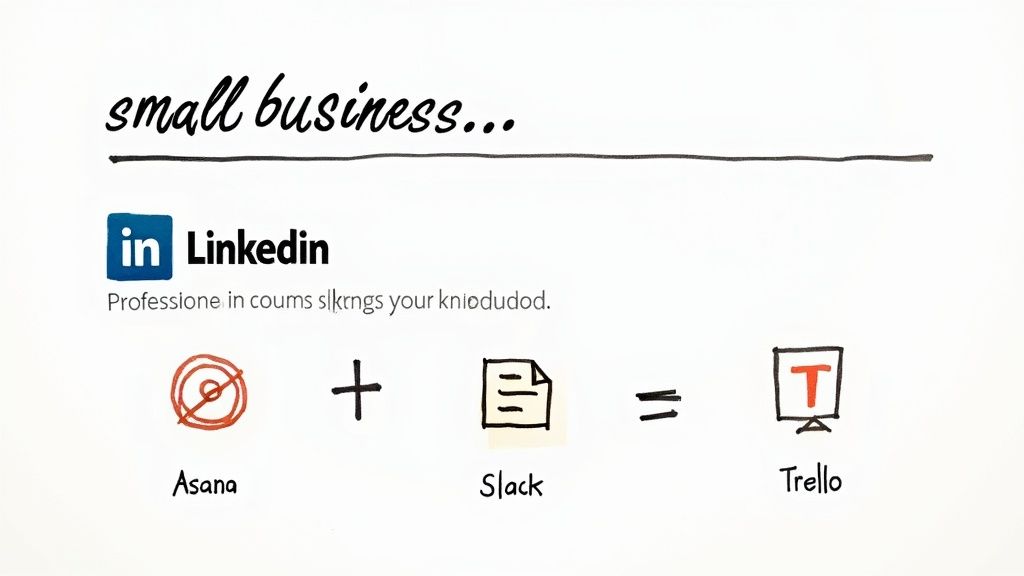
If you want to land the best contract jobs remote, it’s time to stop thinking like an employee and start acting like a business of one. Your professional brand is your storefront. Clients aren’t just hiring a person; they’re investing in an expert who can solve their problems with minimal hand-holding.
This means your old resume that just lists job duties won’t cut it. Your entire approach needs to shift towards project-based wins and hard numbers. Don’t say you “managed social media.” Instead, show them you “grew social media engagement by 45% in six months by rolling out a new content strategy.” That simple change—from responsibility to result—is the bedrock of a powerful contractor brand.
Showcasing Your Remote Readiness
For remote contract roles, the hiring manager has one big question looming: can you actually deliver without someone looking over your shoulder? You have to prove you’re a self-starter who’s already fluent in the language of remote work.
Sprinkling your resume and profiles with the tools of the trade is a simple way to show you can integrate into a virtual team from day one.
- Project Management: Mention your experience with platforms like Asana, Trello, or Jira.
- Communication: Highlight your fluency in Slack, Microsoft Teams, and Zoom.
- File Sharing: Note your comfort with Google Workspace or Dropbox.
By listing these, you’re answering their unasked questions. It’s a small detail that screams, “I’m ready to go.”
When a client sees you already know their tech stack, you’re not just a candidate; you’re a plug-and-play solution. You’ve instantly reduced their perceived risk and onboarding time, making you a much more attractive hire.
Optimizing Your Digital Footprint
In the remote world, your digital presence is your professional presence. Knowing how to build your personal branding online is non-negotiable for snagging those high-paying contracts. Your LinkedIn profile is usually their first stop, so it needs to be more than a digital resume—it should be a compelling sales page for your services.
Start with a killer, keyword-rich headline. Ditch “Marketing Manager” for something like “Content Marketing Contractor | SEO & Lead Generation Specialist.” Right away, clients know exactly what problems you solve. For a deeper dive, our guide on crafting the perfect resume for remote jobs has specific tactics you can apply to your LinkedIn summary and experience sections, too.
Finally, your portfolio is the ultimate proof. Don’t just dump a bunch of your past work in there. Curate it. Turn it into a showcase of your best results by framing each project as a mini case study:
- The Problem: What was the client’s biggest headache?
- Your Solution: What specific strategy did you implement?
- The Result: What measurable outcome did you achieve for them?
This structure proves you’re not just a doer; you’re a strategic thinker who delivers real, tangible value. And that’s exactly what every client is looking for in a remote contractor.
Smarter Strategies for Finding Remote Contracts
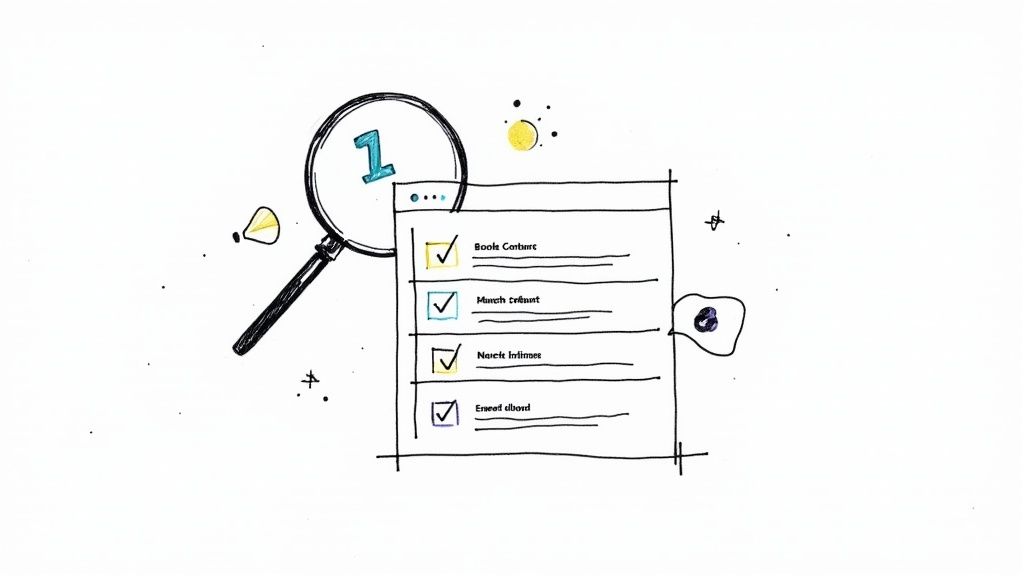
Endlessly scrolling through generic job boards is the fastest way to burn out. If you want to land high-value contract jobs remote, you have to ditch that habit and get strategic. The best opportunities are rarely stumbled upon; they’re found through a focused, multi-channel approach.
Think of it as the difference between fishing with a wide net and a spear. A net catches a lot of junk you have to sort through later. A spear lets you pinpoint your target and go right for it. This means looking past the front page of the big job sites and learning to use the powerful tools they have hiding in plain sight.
Master Advanced Search and Smart Alerts
Most job platforms, from LinkedIn to the niche boards, are packed with advanced search filters that 90% of users probably never touch. This is your chance to get a serious edge. Instead of just typing “remote marketing contract” and hoping for the best, you need to get granular.
- Filter by Contract Type: Look for specific checkboxes like “Contract,” “Temporary,” or “Project.” This simple click instantly removes all the full-time noise.
- Use Boolean Search: This sounds technical, but it’s easy. Combine keywords with operators like
AND,OR, andNOT. A search like"Content Strategist" AND (SaaS OR B2B) NOT "full-time"is way more powerful than a simple phrase. - Set Up Smart Alerts: Once you’ve crafted the perfect, hyper-specific search, save it. Then, turn on email alerts for that search. This flips your job hunt from an active time-suck to a passive system that brings the best roles straight to your inbox.
This kind of proactive filtering can save you hours of wasted time and puts you in the first wave of applicants for the most relevant gigs. Not all platforms are created equal, though. Our guide to the best remote job websites breaks down where you should focus your energy for the highest return as a contractor.
Go Where the Best Roles Are Shared First
Here’s a secret: the most lucrative contract jobs remote often get filled before they ever see a public job board. They’re passed around in tight-knit, niche communities where hiring managers go to find proven talent. Getting inside these circles is a game-changer for your career.
These communities are usually hiding in plain sight. I’m talking about professional Slack or Discord channels dedicated to your craft. For a developer, it might be a community for a specific coding language. For a designer, it could be a group centered around a tool like Figma.
The real magic of these communities isn’t just the job postings board. It’s about building a reputation. When you start answering questions and sharing what you know, you become a go-to person. Soon enough, opportunities will start coming directly to you.
Finding these groups requires a little detective work. Check the footers of industry blogs for links, ask your peers for recommendations, or search directly on platforms like Slack. Becoming an active, genuinely helpful member is the best long-term strategy you can have.
To help you figure out where to spend your time, it’s useful to understand how different platforms work for finding contract gigs.
Remote Contract Job Platform Comparison
Here’s a quick breakdown of the different platform types to help you focus your search for remote contract work.
| Platform Type | Best For | Potential Drawbacks |
|---|---|---|
| General Job Boards | A high volume of listings across a wide range of industries. | Can be overwhelming with irrelevant roles; fierce competition. |
| Niche Job Sites | Highly relevant, pre-vetted opportunities in your specific field. | Fewer total listings; some may require a subscription fee. |
| Professional Communities | Access to unlisted “hidden” jobs and direct networking with decision-makers. | Requires you to actively participate and build trust to see results. |
Ultimately, a winning strategy combines the laser-focused precision of advanced search with the insider access you get from niche communities. This creates a powerful, efficient system that stops you from chasing dead ends and starts attracting the right kind of remote contracts.
How to Ace the Remote Interview and Negotiation
In a remote interview, you’re not just selling your skills. You’re proving you can be a self-sufficient, reliable partner from hundreds or even thousands of miles away.
Projecting confidence through a screen is a skill in itself. It all starts with showing you’re a pro who can manage their own time and workflow without someone looking over their shoulder. Clients need to trust that you can handle the freedom that comes with contract jobs remote.
So, get ready for questions that dive deep into your work habits and communication style.
A classic one is, “Walk me through your communication process for a new project.” A generic answer won’t cut it. Instead, get specific. Try something like, “On a recent project, I set up a dedicated Slack channel for day-to-day chats, scheduled quick 15-minute check-ins on Mondays and Fridays, and sent a weekly summary email to keep stakeholders in the loop without blowing up their inboxes.” See the difference?
Navigating Common Contractor Questions
When clients ask these kinds of questions, they’re really trying to gauge your reliability and how you solve problems. They want to see you’ve thought through the realities of contract work.
Here are a couple of scenarios you should absolutely be ready for:
- Juggling Deadlines: They might ask, “How do you prioritize when you have multiple client deadlines?” Talk about your system. You could mention using a tool like Asana to map out deliverables and dependencies, making sure you tackle tasks based on urgency and impact.
- Handling Ambiguity: If a client asks, “What do you do when project requirements are unclear?” show them you’re proactive. Explain how you’d schedule a quick call to clarify, document the new requirements in a shared doc, and get their sign-off in writing before moving forward.
Having these real-world examples in your back pocket shows you’re not just capable—you’re a seasoned professional who sees challenges before they become problems. For more prep, check out our guide packed with essential remote interview tips to help you stand out.
Mastering the Art of Negotiation
Once you’ve crushed the interview, it’s time to talk terms. This is the moment you shift from a candidate to a business partner. Your goal isn’t just to get paid well, but to secure a contract that protects you from common headaches like scope creep.
First things first, calculate a competitive rate. Research the market for your role and experience, then add a buffer of at least 25-50% on top of what a full-time salary would be. This is crucial because it covers self-employment taxes, insurance, and all the other overhead you’re now responsible for.
Don’t just state your rate; be ready to justify it. Frame it as an investment that delivers a specific return, not just an hourly cost. This shifts the entire conversation from price to value.
Finally, read that contract. Every single word. Pay close attention to clauses that define the project scope, payment terms, and who owns the intellectual property. A rock-solid scope statement prevents endless revisions, and firm payment terms (like Net 15 or Net 30) ensure you get paid on time.
Nailing these details is the key to building a sustainable career finding contract jobs remote.
The growth in this space has been massive. Since 2020, remote job opportunities in the U.S. have tripled, jumping from around 4% to over 15% of all job postings. This shows a huge shift in how companies are building their teams. You can find more data behind this trend in these remote work statistics on strongdm.com.
Building a Sustainable Career as a Remote Contractor
 Getting that first remote contract is a rush, no doubt. But the real game begins now: turning that one win into a sustainable career. This isn’t just about doing good work; it’s about shifting your entire mindset. You’re no longer just a hire—you’re the CEO of a one-person business.
Getting that first remote contract is a rush, no doubt. But the real game begins now: turning that one win into a sustainable career. This isn’t just about doing good work; it’s about shifting your entire mindset. You’re no longer just a hire—you’re the CEO of a one-person business.
Thriving in the world of contract jobs remote means you play by a different set of rules. Long-term success is built on more than just project delivery. It’s about smart financial management, keeping your client pipeline full, and constantly sharpening your skills to stay ahead of the curve.
This proactive approach is what separates the contractors stuck in a “feast or famine” cycle from those who build a reliable, growing income. A great resource for understanding the fundamentals is this guide on comparing contractor vs. employee roles for tech pros.
Adopting the CEO Mindset
First things first: you have to take complete ownership of your business operations. As a contractor, everything from quarterly taxes to lining up your next gig falls squarely on your shoulders. It takes discipline and a bit of foresight.
- Financial Management: Get into the habit of setting aside at least 25-30% of every single payment for taxes. Seriously, do it immediately. Open a separate business bank account to keep things clean—your future self will thank you when tax season rolls around.
- Client Pipeline: Don’t wait until your current contract is winding down to start looking for the next one. Even when you’re swamped, carve out a few hours each week to network, browse niche job boards, or just check in with past clients.
Thinking like a business owner means you’re always marketing, always networking, and always planning for the future. Your current project pays the bills today; your pipeline-building activities secure your income for tomorrow.
Future-Proofing Your Skill Set
The skills that landed you this contract might be table stakes next year. The most successful contractors are relentless learners who view their professional development as a critical business investment, not an afterthought.
They keep an eye on emerging trends and new tools in their field and actually schedule time to learn them. You don’t have to become an expert in everything, but strategically upskilling in areas that complement what you already do will keep you in high demand. Every project you complete shouldn’t just be another entry in your portfolio; it should arm you with new skills you can sell to the next client.
The global move toward flexible work is only making this more important. For instance, in the Asia-Pacific region, about 68% of companies have over 70% of their staff working remotely. Contractors make up roughly 30% of that remote workforce, showing just how big the opportunity is for those who stay sharp.
This same proactive mindset applies to how you manage client relationships. Setting clear boundaries and managing expectations from day one is the key to avoiding scope creep and burnout. We’ve got a whole guide on how to manage client expectations that can help you build healthier, more profitable partnerships.
Of course. Here is the rewritten section, crafted to sound completely human-written and natural, following all your specified requirements.
Common Questions About Remote Contract Jobs
As you start exploring the world of remote contracting, you’ll probably find the same questions popping up again and again. Getting a handle on these is key to moving forward with confidence and landing the right kind of work.
Let’s clear up some of the most common hurdles you’ll face when you start looking for contract jobs remote.
What’s the Difference Between 1099 and W-2 Contract Roles?
First things first: you absolutely have to understand your employment classification. It’s not just jargon—it directly affects your taxes, benefits, and how you operate. The two big ones you’ll see are 1099 and W-2.
A 1099 contractor is basically a business of one. You’re self-employed, which means you’re on the hook for your own self-employment taxes (that’s Social Security and Medicare) and you have to sort out your own benefits, like health insurance.
A W-2 contractor works a bit differently. You’re technically an employee, but of a third-party staffing agency, just for the length of that specific contract. That agency manages your payroll, withholds taxes from each paycheck, and might even offer a benefits package.
The real difference comes down to control versus responsibility. As a 1099, you get more freedom, but you also carry the full weight of taxes and admin. A W-2 role feels more like a traditional job, just with a clear end date.
How Do I Set My Hourly or Project Rate?
Figuring out what to charge is easily one of the most nerve-wracking parts of contracting. Go too low, and you’re leaving money on the table and devaluing your skills. Go too high, and you might not get any bites at all. The goal is to hit that sweet spot where your rate reflects your value and covers all your costs.
Start by doing some market research. What are other people with your skills, in your industry, and with your level of experience charging? Check out sites like Glassdoor and LinkedIn Salary to get a solid baseline.
But don’t stop there. You have to factor in your overhead—all the stuff a traditional employer would normally cover.
As a rule of thumb, your contract rate should be at least 25-50% higher than what you’d make in a similar full-time salaried role. That extra buffer isn’t just profit. It’s what you’ll use to pay for your self-employment taxes, health insurance, retirement savings, and any tools or software you need. Don’t make the classic mistake of shortchanging yourself on these business essentials.
Are Short-Term Contracts Worth It?
Yes, absolutely. While everyone dreams of landing a stable, long-term contract, don’t overlook the power of short-term gigs. They offer some serious strategic advantages that can give your career a major boost.
Short-term contract jobs remote are fantastic for:
- Building Your Portfolio: They’re a quick way to add new clients, different industries, and fresh projects to your resume, proving just how versatile you are.
- Gaining New Experience: A three-month project is the perfect low-risk way to try out a new skill or dip your toes into an industry you’re curious about.
- Filling Schedule Gaps: Let’s be real—they keep the cash flowing between those bigger, long-term gigs, helping you avoid the feast-or-famine cycle.
Think of it this way: a successful short-term contract is often an audition for something bigger. If you can come in and knock a small project out of the park, you build instant trust. That’s what leads to repeat business or a glowing referral that lands you your next big thing.
Ready to find your next opportunity? Remote First Jobs connects you with thousands of verified, high-quality remote contract roles from top companies. Start your smarter job search today and land the flexible career you deserve. Find your next role at https://remotefirstjobs.com.


